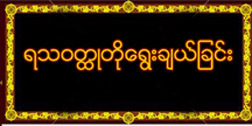Buddhist Doctrines of the Pāli Nikāyas: Analysis and Interpretation
ME01 08-04-2011 (2:00 to 3:00 )
(Class Notes Only)
-------------------
In the Sakka Panhā Sutta , the Sakka said to Pañcasīkha of the Gandhabbas: ‘The Blessed Lord of Buddha is staying in Magadha, to the east of Rajagaha, by a Brahmin village called Ambasanda, to the north of the village on Mount Vediya, in the Indasala Cave. I propose to go visit him.’
Pancasikha taking his yellow beluva-wood lute, he approached the Indasala Cave to Buddha and Thinking: ‘As far as this is neither too far nor too near to the Lord, and he will hear my voice,’ he stood to one side. Then, to the strains of his lute, he sang these verses extolling the Buddha, the Dharma, the Arahants, and love:‘Lady.
Pancasikha taking his yellow beluva-wood lute, he approached the Indasala Cave to Buddha and Thinking: ‘As far as this is neither too far nor too near to the Lord, and he will hear my voice,’ he stood to one side. Then, to the strains of his lute, he sang these verses extolling the Buddha, the Dharma, the Arahants, and love:‘Lady.
“Sītodakim pokkharanim yuttam kiñjakkha-renunā Nāgo ghammābhitatto va ogāhe te thanñdaram.''Accamkuso va nago ca jitam me tutta-tomaram, Karanam nappājānāmi sammatto lakkhanūrasā.' Tayi gathita-citto 'smi cittam viparinamitam, Patigantum na sakkomi vañka-ghasto va ambujo.
Just as medicine to him who’s ill, or nourishment to one who’s starving still, Bring me, gracious lady,‘sweet release with water cool from my consuming flames. The elephant, oppressed by summer heat, Seeks out a lotus-pool upon which float Petals and pollen of that
flower, so into your bosom sweet I’d plunge. As an elephant, urged by the goad, Pays no heed to pricks of lance and spear, So I, unheeding, know not what I do, Intoxicated by your beauteous form.
It is often stated that the Gandhabbas preside over conception; this is due to an erroneous translation of the word gandhabba in passages dealing with the circumstances necessary for conception (mātāpitaro ca sannipatitā honti, mātā ca utuni hotī, gandhabbo ca paccupatthito hotī). The commentaries explain that here gandhabba means tatrūpakasatta - tasmiṁ okāse nibbattanako satto - meaning a being fit and ready to be born to the parents concerned. The Gandhabbas are regarded as the heavenly musicians, and Pancasikha, Suriyavaccasa and her father Timbaru are among their number.(gan+doga+tabbo=gandhabbo).
They wait on such devas as Sakka, and the males among them form the masculine counterpart of the acchara, the nymphs. Their king is Dhatarattha, ruler of the eastern quarter.
Therefore, in the Ᾱtānātiya sutta:“King Dhatarattha in the east, King Virulhaka in the south, King Virupakkha in the west and King Kuvera in the north.”“Puratthimena Dhatarattho, Dakkhinena Virulhako;Pacchimena Virupakkho, Kuvero uttaram disam.”
Mahasamaya Sutta (great meeting), Preached at Mahavana in Kapilavatthu, was staying with five hundred arahants, The Buddha then addressed the monks and recited this sutta.
It is possible to divide the discourse into three parts.
The first contains a list of the devas and other beings present to worship the Buddha. It is a long list of strange names given in verses. A similar list of devas is found. The list of gods should be compared with that given in the Atanatiya Sutta. The second part of the sutta is the framework of the words attributed to the Buddha, introducing the list of devas, giving the Buddhas warning to the monks to beware of Mara and Maras declaration that he had no power over them as arahants are free from fear. The third part of the sutta may be called the prologue, the verses of greeting spoken by the devas from Suddhavasa.
And most of the devatas from ten world-systems have gathered in order to see the Blessed One and the Bhikkhu Sangha at Kapilavatthu in the Great Wood. Let us also approach the Blessed One and together with a large Sangha of about five hundred bhikkhus, all of them arahants, on arrival, let us each speak a verse in his presence." “Yebhuyyena bhikkhave dasasu loka-dhatusu devata sannipatita Tathagatam dassanaya bhikkhu -samghan ca.”
Then the thought occurred to four devatas of the ranks from the Pure Abodes A great meeting: The deva hosts have assembled. We have come to this Dhamma meeting To see the invincible Sangha. Then another devata recited this verse in the Blessed One's presence.The bhikkhus there are concentrated, Have straightened their own minds (Tatra bhikkhavo samadahamsu cittam). Powerful, effulgent, glamorous, prestigious, rejoicing, have approached the monks' forest meeting. (Iddhimanto jutimanto vannavanto yasassino,etc,).
By the way, the Dhamma theory as presented by the Theravadins. Moreover, this view is quite consonant with the statement occurring in the earlier texts that the Dhammas come to be without having been (ahutva sambhonti) and disappear without any residue (hutva pativenti).
“Sabbepi no ruparupino dhamma ahutva sambhonti hutva hutva pativenti.”
(bhutavaa sambhavesiva- ‘sam+bhava+esi’ = those who are already born or those who are to be born)
On this interpretation, the three characteristics of conditioned reality (sankhatalakkhana) namely, origination (uppada), cessation (vaya), and the alteration of that which exists (thitassa annathatta) are universal characteristics (samanna-lakkhana). If they were to be so elevated, that would undermine the very foundation of the Dhamma theory, for instance, origination (uppada), subsistence (thiti), and dissolution (bhanga) are postulated as real and discrete entities, then it would be necessary to postulate another set of secondary characteristics to account for their own origination, subsistence, and dissolution, thus resulting in an infinite regress (anavatthana).
“Anichcha Watha Sankara Uppada Vaya Dammino Uppajjitva nirujjhan'ti Tesam vupasamo sukho. ‘Impermanent, alas, are all conditions, arising and passing away having been born they all must cease the calming of conditions is true happiness’.”
by Ashin Indaka (Kyone Pyaw)























0 comments:
Post a Comment